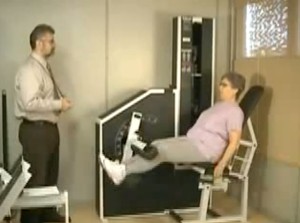FAQ
What is slow motion, high intensity strength training?
Slow motion, high intensity strength training (also called HIT), is a resistance training program that was developed by Ken Hutchins in 1984 for an osteoporosis study at the University of Florida. He calls it SuperSlow®, and has federally trademarked the use of these words.
It’s a protocol that calls for the weights to be lifted very slowly (10 seconds positive) and lowered very slowly (10 seconds negative), thus greatly reducing the risk of injury, and significantly increasing the intensity and time under load (TUL). For your safety and endurance, both proper alignment in the machines and correct breathing are taught and closely monitored by your trainer.
The result is a workout that takes only 20 minutes, twice a week!
Can I really expect to get results from a 20-minute workout?
Yes! Slow motion high intensity strength training is just what it says, intense. By moving the weights slowly, instead of quickly where momentum can be recruited as an aid, the intensity of the work out is greatly increased. We endeavor to work each muscle group to full fatigue in less than two minutes.
How often should I work out?
Each person and each muscle group may require different recovery periods in order to assure maximum growth. As a rule of thumb, novices and those with smaller muscles need as little as 24 to 48 hours of recovery, while advanced subjects and those with large muscle mass typically require 5 to 14 days of recovery between workouts.
James will recommend the ideal workout program and schedule for you, but generally if you’re a novice you could work out as many as three times the first week as you learn good form and your trainer experimentally approximates your ideal resistance for each exercise. After that you will want to reduce the frequency of your workouts to twice a week until you reach your genetic maximum, and then to once a week. Once you’ve reached your genetically determined maximum strength, you could opt to train every 7 to 10 days to maintain that strength.
What is the duration of a typical workout session?
About 20 minutes. It takes only 1 to 3 minutes to inroad the muscles during each of 5 or 6 compound exercises. That adds up to about 10 to 15 total minutes under load. Add a minute or less to move to each successive exercise, and you end up with an exercise session of about 20 minutes in duration.
We usually schedule half-hour sessions, which allows a few extra minutes to preset the seat positions and weight stacks for each client, review progress charts with the client, schedule new appointments, accept and record payments, etc.
Isn’t working out this intensely dangerous?
For the vast majority of people the answer is “no”. In exercise the real dangers come from misalignment and force. At Alive! Fitness Studio, Inc. every client is properly aligned (i.e. positioned) in the equipment for each exercise, and these settings are recorded on the client’s chart to assure accurate replication at each workout session.
As for force, by nearly eliminating acceleration, we greatly increase safety. Force requires a mass under acceleration (F-MxA). By minimizing acceleration, force is almost completely eliminated.
What about working out to lose weight?
Well…yes, and no. A 45-minute jog on a treadmill will use up about 60 calories. Even though the treadmill readout will say 300 calories expended, you would have burned 240 of them just doing nothing! That’s because of your muscle mass –three pounds of lean muscle will burn about 333 calories a day at your basal (resting) rate. This is why our objective is to assist you in building lean muscle. The more lean muscle you have, the more efficiently you’ll burn up those calories.
One thing to note – lean muscle weighs more than fat. So, while you are doing strength training you’re replacing fat with muscle, it may not result in significant weight loss. Weight loss will occur if your caloric intake is less than your caloric output.
Is slow motion high intensity strength training safe for people over age 60?
Yes. In fact, this form of workout was developed for an osteoporosis study of elderly women at the University of Florida in the early 1980’s. By moving the weights slowly and reducing the force, the greatest risk to older clients is virtually eliminated. That’s why we call if SafeStrength™!
Not only is it safe, strength training is really the only way to reverse the loss of muscle mass that begins to occur after age 35. Loss of muscle (sarcopenia) is the number one debilitating factor in our society. Without strength training, the human body loses approximately 1% of its’ total muscle tissue every year after age 35.
Some simple math tells us that without strength training, by age 70 a person has lost a significant amount of muscle tissue, resulting in the use of walkers, wheelchairs, and assisted living situations. This is unnecessary if the proper strength training regimen is started – and muscle tissue can be strengthened and re-built at almost any age. It is never too late to start!


